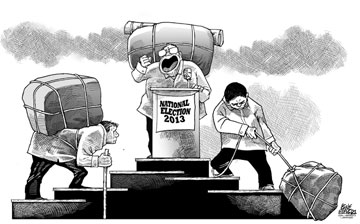No trade-off

In traditional politics, behind the sweet promises lie vested interests.
Traditional politics or trapo has been demonized and no public official wants to be portrayed as such.
The word trapo carries powerful imagery of an ugly, stinky and dirty rag.
But how can powerful politicians be described that way?
They ride shiny, expensive cars. They wear designer clothes and mingle in privileged company.
Article continues after this advertisementThe revulsion comes not in the appearance but how they manipulate power to serve interests of self-gain rathern than the welfare of citizens.
Article continues after this advertisementTraditional politics, also called patronage politics, is an aberration of power relations that diminishes the value of public service.
As delegated authorities, elected political leaders are supposed to create the fullest opportunities for propsperity for all citizens.
Trapos do the opposite.
They encourage the patronage of a few supporters by rewarding them with key positions in government and other favors even though they come without merit.
The case of the Liberal Party ticket in Lapu-Lapu City is instructive.
If reports are true that the candidates split up over a proposal to hire their campaign supporters in City Hall, in anticipation of viction in the election, the issue was basically premeditated patronage politics.
The idea was nipped in the bud by early exposure by fellow partymates who insisted on holding on to a sense of decency.
Genuine public service is not the subject of trade-offs like this.
It’s up to voters to discern what is behind the promises and beautiful projections of candidates.
They have to search carefully through the bag of tricks offered by candidates as false solutions to real problems besetting the community.